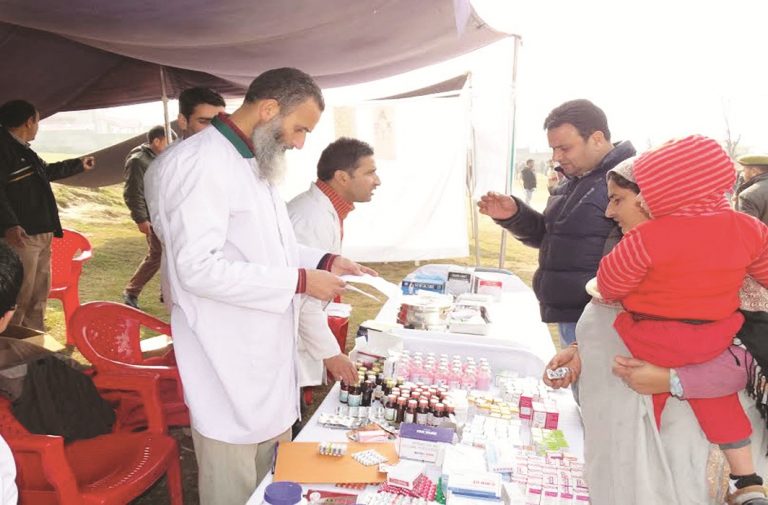
Above: Paramedical staff giving free medicines to patients during a day-long medical camp in Srinagar/Photo: UNI
As public health is a state subject, central welfare schemes can be run through it, making it easier to implement a GST Council for healthcare and espousing the cause of co-operative federalism
By Dr KK Aggarwal
Every citizen in the country has a right to health (under Article 21 of the Constitution) without any discrimination (under Article 14). Article 47 of the State Directive Principles imposes a duty on the State to raise the level of nutrition and standard of living and improve public health. The government, therefore, has a constitutional responsibility to provide good quality healthcare to all citizens that is available, accessible, affordable and accountable. These are also the basic principles of universal health coverage.
India is a federal republic, i.e., it is a union of states. The distribution of legislative powers between the Union and state governments has been specified in three lists—Union list, state list and concurrent list. The Union health ministry implements various national health programmes. It is responsible for the prevention and control of major communicable diseases, promotion of traditional and indigenous systems of medicines and setting standards and guidelines, which state governments can adapt.
Public health, along with sanitation, hospitals and dispensaries, falls under the state list. This means that the primary responsibility to provide healthcare lies with the state government, making health a state subject. Other health issues such as food adulteration, drugs and poisons, population control and family planning, medical education and the medical profession have been included in the concurrent list. Both the Union and states can legislate on these subjects. In case of any dispute, the Union law will prevail, though the state can still override this with presidential assent. All public health initiatives and national health programmes need to be routed through the states.
The centre has its own health schemes. This year, it implemented Ayushman Bharat (although a few states opted out—Delhi, Kerala, Odisha, Punjab and Telangana). Likewise, states may have their own individual schemes. Even to practise in a different state, a doctor may require a different licence.
The assertion of the right to implement legislation as per the distribution of powers has often led to discordance between the states and the centre. Ironically, the sufferer usually is the general public for whose very benefit the schemes are formulated.
Now, Union Finance Minister Arun Jaitley has made a case for developing a federal institution like the Goods & Services Tax (GST) Council in the healthcare and farm sector. Such a federal body in the healthcare sector, he feels, should face least resistance from states as welfare schemes would be implemented through them with the centre only coordinating it. “The federal institution experiment of the GST having succeeded…there are two other sectors which eminently require federal institutions of this kind. The GST was constitutionally provided for. Those areas are not constitutionally provided for, but political maturity can impose on governments to try that experiment. One is healthcare and one is agriculture,” Jaitley said. Both the states and the centre, he said, were spending on healthcare and had their respective schemes.
The GST Council makes recommendations to the Union and state governments on issues related to GST. As per Article 279A, it is a joint forum of the centre and states. The central government’s vote in the GST Council is one-third of total votes cast, while the votes of all state governments taken together have a weightage of two-thirds of the total votes cast in that meeting. As far as GST is concerned, many healthcare services are exempted. However, plastic surgery, drugs, devices and disposables have GST imposed on them.
The GST Council can be said to be an example of “co-operative federalism”, where the Union and states work together to focus on the common good of the public instead of formulating separate policies for individual gain.
By floating the idea of a federal institution in healthcare, Jaitley has perhaps espoused the cause of “co-operative federalism” as exemplified by the GST Council.
This idea is worth exploring and can be conceptualised as a policy in the near future provided all constitutional hurdles and conflicting interests are tackled harmoniously. How far will such a federal institution encroach on the powers of states is one hurdle as public health is a state subject.
Should public health be shifted to the concurrent list? This would be a huge hurdle and can be done only through an act of Parliament. All states have to come together for its successful implementation as they did for GST where the idea of “one country, one tax” is slowly being realised.
The medical fraternity has been demanding “one drug-one company-one price” for long. India is committed to achieving universal health coverage for all citizens by 2030 as part of the Sustainable Development Goals. As a citizen, one has the right to migrate to any place in the country and still expect uniform healthcare at uniform costs. Only then can we say we have achieved universal health coverage.
Just as the government has made the National Eligibility-cum-Entrance Test a uniform examination for admission to medical colleges in India, perhaps the time has come for “one India-one health policy”.
—The writer is president, Heart Care Foundation of India, and president-elect, Confederation of Medical Associations of Asia and Oceania

